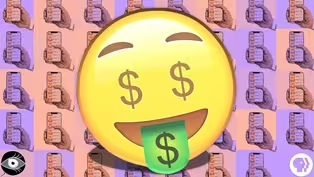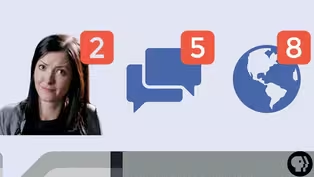
The Attention Economy Needs to Change. But How?
Season 4 Episode 35 | 10m 59sVideo has Closed Captions
So... Could you run Facebook better than Zuckerberg?
So... Could you run Facebook better than Zuckerberg?
Problems playing video? | Closed Captioning Feedback
Problems playing video? | Closed Captioning Feedback

The Attention Economy Needs to Change. But How?
Season 4 Episode 35 | 10m 59sVideo has Closed Captions
So... Could you run Facebook better than Zuckerberg?
Problems playing video? | Closed Captioning Feedback
How to Watch BrainCraft
BrainCraft is available to stream on pbs.org and the free PBS App, available on iPhone, Apple TV, Android TV, Android smartphones, Amazon Fire TV, Amazon Fire Tablet, Roku, Samsung Smart TV, and Vizio.
Providing Support for PBS.org
Learn Moreabout PBS online sponsorshipMore from This Collection
We’re in the middle of an Attention War – where big tech battle it out to win over our eyeballs. Our attention spans are considered a precious—and scarce—commodity. So what is the price of your attention? In this mini-series, we'll explore the psychology, design and impact of tech and social media on both ourselves and society. A new episode will be released every Friday for the next six weeks.
Video has Closed Captions
The emerging monetization of your emotions. (10m 1s)
How One Company Redefined Social Norms
Video has Closed Captions
Facebook's impact on society – how it's changed mass grief and other social norms. (10m 1s)
The Psychological Tricks Keeping You Online
Video has Closed Captions
We take a look at persuasive design – and how good design persuades you every single day. (9m 41s)
Big Tech's Battle For Our Attention
Video has Closed Captions
So, what's the price of your attention? (11m 36s)
Providing Support for PBS.org
Learn Moreabout PBS online sponsorshipNow I want all of you to imagine a scenario.
A big scenario.
You are the CEO of Facebook.
You have 2.2 billion monthly users, arguably giving you more influence than any world or religious leader.
You employ some of the smartest people and you are among the top 10 richest people in the world.
You spend some of your wealth on charity and and buy a dog that doubles as a mop.
But beyond your mop-dog, you’ve got some bigger issues.
Your company is under intense scrutiny.
You have been fined by governments of several countries.
You face criticism for employing manipulative tricks to keep users hooked just to serve them ads.
You hear outcries that your platform has become an engine for spreading misinformation and propaganda.
You are accused of allowing foreign governments to disrupt elections.
What you’ve built to connect people, is now being used to fuel hate crimes and even genocides.
Clearly something needs to be done.
Some call for your company to be broken up into smaller, more manageable pieces.
Others suggest you change your business model and curb its reliance on ads.
You could ask governments for funding, because your product is now essentially public utility.
Or… you could do nothing and continue to earn money because you have more power than anyone anyway.
If you were calling the shots, what would you choose to do?
There’s now a widespread reckoning that social media and other tech, which many of us, myself included, quickly embraced, comes with a cost to our personal lives and our society.
If we want a better future, we have to find a way to fix these problems.
This has led many of us to ask, what is our role as citizens?
What is the responsibility of the companies themselves?
And what can governments do to ensure big tech companies will behave more ethically?
This is a particularly difficult question because never in history have we encountered companies as large as Facebook or Google or Amazon.
Their user base is a big chunk of the world population and their revenue exceeds the GDP of entire countries.
With this unprecedented scale, come new questions.
When does a big company become TOO big?
In fact, we’ve faced a similar question before.
More than a 100 years ago, Louis Brandeis, a Supreme Court Justice, warned about the dangers of corporations becoming too big.
He argued that if we don’t develop any rules, a business could achieve a level of near-sovereignty, but without the checks and balances that we have for elected political authorities.
He called this called the “curse of bigness.” So Brandeis introduced antitrust laws and public utility regulation.These strategies worked pretty great for the economy for decades, but eventually businesses also evolved.
Major tech companies are shapeshifters that don’t fit into well defined categories like retail or news media, for which we already have rules.
What’s more, laws that were set to prevent monopolies and protect consumers from rising prices, don’t apply to these corporations.
After all, businesses operating in the attention economy defy the metrics of antitrust law, because they offer free services.
And so today, the curse of bigness is back.
I strongly believe that some of the big tech platforms have too much power...
I think that something has so much control over what you see and hear and understand is getting at, you know a real, it's getting at attention, which is, as I said, the key.
And everyone knows that what you're exposed to controls what you think ultimately, uh, you know, where you've grown up, whatever.
And so if you have that power, you ultimately start to have a power I think that rivals government.
And we’re starting to ask for checks and balances on these powers.
There has been an increasing sense of people going, okay, that might've been enough and that's hardly surprising.
In most moments in our society it takes a while for the technology to go from being brand new, shiny and very exciting to going, eh.
And I think we're on the kind of the back end of some of that right?
And my suspicion is looking even at the data about how people use new services and new devices is that people are actually spending a lot less time with certain parts of the ecosystem.
So if you look at facebook's numbers, for instance, they have, uh, seen a growth in the 50 to 60 year old usage but a diminishing in the under 25.
The Facebook exodus in particular is significant: Nearly half of users ages 18 to 29 have deleted the app from their phone in the last year, a new survey has found.
Another survey revealed that even teens think teens spend too much time on their phones.
Now, I remember clearly when I first used the internet, when I saved up money from my part time job to buy my first phone and when I first watched YouTube.
But there’s a whole generation that are even younger than Facebook.
Everything is very centered around being online and so whether it's even if it's something that's supposed to be good, like doing my homework, I'm online and then I'll be texting my friends that's online.
when I'm not actively doing something to try not to be online by default, I'm online.
Even though this generation was born into an online world, some are now questioning it.
Many are highly suspicious of internet companies.
In a new study of 13 to 17 year olds this year, nearly three-quarters of teens said they believe tech companies are manipulating users to spend more time glued to their devices.
I mean the whole idea of snapchat streaks where you.
It only works if you snapchat.
Snapchat somebody every day, is literally just so that people will come back and use the app more We have a certain amount of willpower but at some point when we have all these ads and all these youtube recommended videos and that, it just becomes too much and that's how we get distracted.
We're just like, oh yeah, this looks cool.
It's only three minutes and then we see like all these short videos and we start watching more and more and then eventually we have a homework assignment due tomorrow and sort of bedtime and you know, they haven't done it yet I know I sound like I'm blaming all of these issues that are obviously something that I can control all of these tech companies, but it does feel like I'm 13 years old, it shouldn't be my responsibility wholeheartedly to ensure that I'm not wasting all my time on social media.
Whether you’re 13, or 33 or 73, it’s likely that it’s not solely your responsibility that internet businesses behave ethically.
It’s also their responsibility.
Or, well, yours, if you were the CEO of Facebook.
I would probably try and change the company to make it so there's like less ads and stuff because like facebook makes so much profit that they don't need the ads because that just gives them even more profit and then that is what like is distracting kids and all that stuff.
Beyond distraction, some say there should be a cap on how large a company can grow.
And tech companies should be broken into smaller pieces.
If I think about Facebook, we don't need a, a monopoly.
We don't need an outsized, a single platform that controls so much attention.
There should at the very least be competition in that sphere of, better competition, uh, people who pledge to serve you as opposed to trying to suck as much out of you as I can and spit it out to somebody else.
So I think we need a revolution in the business models, frankly, and someone who promises to do more for us as opposed to taking so much from us.
That revolution in business model could be converting to a subscription model instead of selling users information to advertisers.. Or creating ways for users to be in control of where and how we sell our data.
Others say Facebook, Twitter and other internet services should be considered public utility, like electricity or transportation.
They've become so ingrained into our society, that we don’t want them gone--we just need to make sure they are serving us in the right way.
A public good is something that operates in society.
It's highways, it's national parks, it's things that economically don't stack up to be protected by the average person, but are protected by a governing body, or an NGO, or an entity.
And through that manner, perhaps facebook is a public good perhaps because it gives our digital selves and informational highway, it connects us with the people we want.
It's become so integral that maybe it should be devolved away from companies and into the hands of the civil society.
Whether it’s Facebook connecting us, YouTube delivering educational videos or Instagram being a public art space, these could all be utilities.
And so perhaps they should be operated differently.
Regulators in the US and Europe have started to scrutinize the tech industry.
But, the truth is, it takes time for any new regulations to come.
The good news is that, people, too, have power.
No matter how large the tech industry is, it still needs you.
I think we need a revolution, frankly.
I think people need to collectively re-seize what it means to be human.
That we need to resist companies that have a business model that is not serving us.
You could quit if you can.
You could demand your representatives in government hold companies accountable.
You could protect your data and be intentional with your screen time.
You could watch this series and follow investigations by news media to stay on top of what’s happening.
You know, we always look back later and say, how was it that we allowed that to happen?
We just let ourselves sit there, you know, uh, lying in bed, scrolling through whatever screens and like, wait, why didn't I get any sleep?
What happened?
Where did my kids go?
You know, I think that, uh, we're going to regret some of the periods of this era, but I think we have the capacity to learn and do better.
There’s a lot of good that comes with technology.
But new innovations can also bring new curses and can make mistakes.
As Louis Brandeis, the judge who warned of the curse of bigness, said: “The greatest dangers to liberty lurk in the insidious encroachment by men of zeal, well meaning but without understanding.” We now have to break the curse.
It’s the responsibility of all of us to take a step back and criticise our modern technologies, identify the problems, fix them and make a better, safer future.
It’s now clear that attention economy needs to change.
And you can be part of that change.


- Science and Nature

A documentary series capturing the resilient work of female land stewards across the United States.












Support for PBS provided by:





